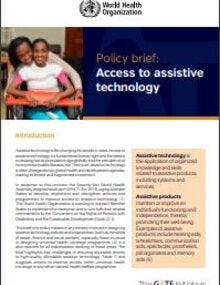Overview
The need for assistive technology is rising rapidly with global ageing and increasing prevalence of noncommunicable diseases. Yet, assistive technology is often disregarded on global health and development agendas, resulting in limited and fragmented investment in the sector.
This policy brief highlights key challenges in ensuring equitable access to assistive technology. It provides concrete actions to improve access across five key areas - people-centred: policy, products, personnel and provision (5P). The brief is targeted at policy-makers involved in designing assistive technology policies and programmes, especially those involved in designing universal health coverage programmes. It is also relevant for all stakeholders working in these areas.
The brief aims to raise awareness of the individual and societal benefits of improving access to assistive technology within universal health coverage. It describes how access to assistive technology is life-changing for people in need, and how improving access benefits everyone. Including assistive technology within universal health coverage and strengthening provision through primary health care will help to foster healthier populations and future generations that can participate and contribute more fully in education, labour markets and civil society.
|

